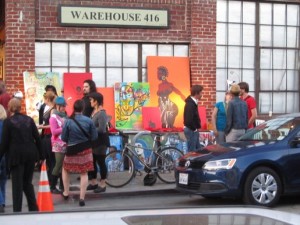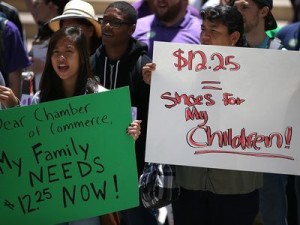Smashed Up
This article first appeared on the East Bay Solidarity Network site. Thanks to Solidarity members for permission to republish.
Young service workers on the sanctity of small business.
It was the first Friday of December, which in Oakland usually means hoards of people descending onto Telegraph Avenue for the monthly Art Murmur festival. But on this night, a much different crowd filled the streets. After successfully shutting down the 880 freeway and West Oakland BART station, hundreds of people outraged at the recent police murders of Mike Brown and Eric Garner marched towards 14th and Broadway downtown. Suddenly, the sound of shattering glass echoed everywhere; someone had smashed out the windows of a new wine bar. Cheers of joy went up from most of the crowd, but a few rushed to protect the vandalized shop: “Stop! This is a local business!”
Although corporate chains bore the brunt of the vandalism and looting in the most recent wave of actions against police murders, protesters also tagged and smashed windows at smaller businesses in gentrifying neighborhoods like Temescal and Downtown Berkeley. In the wake of these actions, some movement sympathizers have been quick to criticize the vandalism of local businesses, implying that locally owned businesses are not a legitimate target of popular anger. Even some who sympathize with property destruction of corporate targets like Chase Bank argue against targeting small businesses.
Based on our experience working for small businesses and as white workers who are actively in solidarity with the Black Lives Matter movement, we want to suggest that not only is it appropriate to organize against and express anger at such places, but given the corresponding rise of upscale establishments, mass displacement, and police violence in the Bay Area, it may also be a strategic direction for our movements.
Locally-grown exploitation
The defense of small businesses in the Bay Area relies on a misplaced liberal morality which contrasts “good” local businesses and “evil” corporate ones. This dichotomy has become dogma for many people, who amount their consumer choices to brave political acts. Feel bad about sweat shops? Purchase your next gift at a local boutique! Recession got you down? Shovel dollars into your local economy and dad just might get his job back. But are local businesses actually better for the majority of us?
The dominant image of small businesses as Mom and Pop stores run by elderly couples who work long hours as a labor of love is not reflected in the local economy. The reality is closer to a young, wealthy owner who does not work in their own store but instead employs a small group of wage laborers. And since small businesses don’t have the profit margins of large corporations, they often rely on sweatshop discipline and poverty wages to make ends meet. Most anyone who has worked in the industry can attest to a repressive atmosphere: workers are not allowed on breaks, are scolded for talking to co-workers and punished for showing up five minutes late. Furthermore, even service workers who make tips frequently earn below a living wage and are subjected to unpredictable work schedules that necessitate finding a second or third job. When these practices happen at large corporate chains, they become the themes of documentaries, muckraking articles in the liberal press, and bumper sticker slogans. But when they’re used by local businesses, they’re written off as necessary evils.
In higher-end establishments, employers frequently justify poor treatment by trying to instill pride and artistic ambitions in their employees; workers are all but required to do extra learning, research, and labor outside of the workday to satisfy the employers’ need to serve the coolest new cocktail or coffee bean. At a recent mandatory meeting for an East Bay-based organic catering company, workers were told by the CEO: “This is not a job; it’s a craft. You are all artists, and you should treat your job as such. If you don’t, you won’t succeed in this company.” What he was saying was that if you do not invest hours off the clock in becoming a more efficient and valuable worker, we won’t employ you.
By romanticizing small businesses like the hip restaurants, cafes and bars currently springing up all over Oakland, we gloss over the experiences of the low wage workers who make them possible. When compared to the horrendous treatment that service workers must endure, the shattering or spray-painting of a few windows does not even the score.
A  divided house
divided house
While we as low wage white service workers are exploited by small business owners, we must recognize that our race and class positions heavily shape our treatment in the workplace. Our jobs are often segregated in much the same way the Bay is, that is, although we work for the same employer, our experience of work is dramatically different. Young service workers are often subjected to bad treatment and low wages, but they are also offered the jobs that pay relatively better, bring in tips and earn more respect from management. Back of the house workers (i.e dishwashers, lower-level cooks), in addition to dealing with unpredictable schedules, job instability, and intense pace of work, are also paid less and completely excluded from the broader culture and decision-making of the workplace. Back of the house employees are usually immigrants and almost always people of color, and are thus subjected to a variety of racist abuses from higher-ups. At our work places we’ve seen chefs berate prep cooks for “not speaking English correctly,” small organic farmers complain that their Latino farm workers are “lazy because they hang out with their family and community too much,” and a group of immigrant women workers be falsely accused of stealing and subsequently fired. Multiply these encounters thousands of times and you get an idea of the nature of local business in the Bay Area.
Additionally, wage theft among immigrant workers is occurring on a drastic scale. Wage theft in California costs workers an estimated $390 million a year, and it largely affects those in smaller independent businesses, as these employers more frequently operate “under the table” and pay people in cash. Furthermore, workers who try to reclaim these wages by filing complaints with the state only recover roughly 17 cents on the dollar, as businesses have developed a variety of tricks to avoid payment.
As white workers, we realize that there is a huge difference in how we experience working in these places. Racial segregation, hierarchies, and exploitation of immigrants prop up these businesses, so it’s important for us to find creative ways to work in solidarity with our coworkers, both in our workplaces and in the streets. Although we too labor under highly exploitative conditions, we must admit the relatively superior position we are in, in terms of the jobs/wages that are accessible to us, and the fluidity with which we can change employers.
Small business, the police, and displacement
Most of the vandalism during recent actions happened in rapidly gentrifying areas where long-term Oakland residents, working class people and people of color are being displaced and upscale restaurants, craft coffee shops and other small businesses are moving in.
These new businesses cater almost exclusively to people with money, both in their aesthetics and in the price of their products. Low wage workers are not the intended market for $12 craft cocktails, $40 dinners and $3 cups of coffee that take 20 minutes to make, even if we can splurge on a night out once in a while. Whole blocks of Uptown are overrun by fancy bars that cater to a gentrifying, privileged class that defines food and drinks by how rare, artisanal and “exotic” they are. In other words, they are marketed exclusively for those with money.
More importantly, as these small businesses move into neighborhoods that have long been populated by working-class people of color, they make demands of the city to protect their investments. This usually means beefing up police presence in neighborhoods targeted for development. As former Oakland Police Chief Anthony Batts said back in 2010,
“I believe police departments are economic drivers. If you have bad stories coming out about crime or bad policing, investors are not going to come to a city. So in an industrial age city that is built much like Oakland has been an industrial age power house, it has to redo itself, it has to re-engineer itself with a different economy, and in order for that to happen you have to have a lot of investment, whether its federal funds or from private investors to come. Nobody’s going to invest in a city when you have a high crime rate so you have to drop that.”
When combined with the suspicion of white neighbors, this increased policing in certain areas can have deadly consequences, as we saw with the police murder of unarmed Alex Nieto in San Francisco in 2014.
Small businesses also collaborate with the city to receive lucrative tax breaks, which line the pockets of business owners and developers, even as those same developers loot the wealth that our communities create through our labor and drive up housing costs. For example, $50 million was invested to renovate the Old Oakland neighborhood, now populated mostly by upscale bars and restaurants which receive a variety of tax breaks and other subsidies from local, state and federal programs. How often do we see these same establishments using their resources, social capital, or political connections to contribute to community struggles for justice? In times of low protest activity, businesses often work actively against the communities they are located in. In a January 2013 “community forum” held at Homeroom, a mac and cheese restaurant in North Oakland, mostly white residents talked about “cracking down on crime” in the neighborhood — a far cry from addressing the displacement of long-term residents. But during the current upsurge in popular anger, small business owners are coming out loudly in the media to assert that they support the fight for racial equality, but as they like to claim, rioting is just distracting from the message. As the executive chef of the wine bar mentioned above said after his windows were smashed: “I understand what you are protesting—what happened to [Eric Garner and Mike Brown] was wrong—but what’s happening to us, that’s fucked up.”
In actuality, this class of small business owners can only survive through the employment of cheap labor, largely provided to them by undocumented immigrants and young people, criminalization of communities of color, and state intervention. They are not upset because rioting “distracts from the message.”, they never cared about the message in the first place. In fact, they are scared because those things which allows them to generate their wealth are finally being called into question and lots of people are listening.
An injustice anywhere
We cannot create exceptions or excuses for exploitation and injustice. As workers in the local service industry, it makes no difference to us whether our boss is a local resident who only owns one or two restaurants, or whether he’s a billionaire CEO living in a mansion. The mere fact that the businesses we work for are built on the exploitation of our labor, racial hierarchies, state violence, and displacement of whole communities, makes them perfectly justifiable outlets for our anger and our movement organizing. We are not just talking about vandalism, but about a broader orientation that rejects the sanctity of small business and re-affirms a strategy based in dismantling white supremacy, police violence and the exploitation of labor.
While we know that merely forcing these businesses out of town would not lead to a more just situation for workers or residents, we also can’t envision a democratic community alongside any space that caters to wealthy, mostly white people and survives through the exploitation of workers and preferential treatment from the state. When the riots inevitably die down, what can we do to continue to express our discontent?
Merely criticizing or vandalizing these upscale businesses will probably not bring us justice. We also need to organize amongst our co-workers, demand better conditions, form pockets of organized workers and take direct action, both in the streets and on the job. Joining our often-segregated workforces together with a strategy rooted in direct action, which at times will include mass rebellion, has the makings of a powerful movement. We’ve seen how much we can do in the streets in a short amount of time — shutting down multiple major routes of transportation for two weeks in a row is no small feat– imagine what we could do if we kept going.
This article was written by the East Bay Solidarity Network.
The East Bay Solidarity Network is an organizing collective based in Oakland. We support working-class and poor people in directly confronting exploitation, violence, and injustice. We organize strategic direct action campaigns against landlords, employers, and the state, as well as form alliances with communities and organizations who are most affected by capitalism and systems of domination. We want to resist all manifestations of oppression that occur in our world, in our organizations, and in ourselves. This means actively fighting white supremacy, heteropatriarchy and colonialism. We also seek to mobilize the resources of privileged communities to lend capacity and tangible support to those who are struggling for their own liberation.
To contact East Bay Solidarity Network, please visit eastbaysol.wordpress.com, or email eastbaysol@gmail.com, or check us out on Facebook. If you’re having a problem with your boss and want to fight back, call us: 510-556-4208. If you’re having a problem with you’re landlord and want to fight back, you can call: 510-239-3219
Articles cited:
http://libcom.org/library/who-gives-orders-oakland-police-city-hall-occupy
http://www.city-data.com/us-cities/The-West/Oakland-Economy.html
http://sf.eater.com/2014/12/8/7354137/windows-smashed-chef-roughed-up-at-brand-new-oakland-wine-bar
http://www.latimes.com/business/la-fi-wage-theft-action-20141024-story.html
https://oaklandnorth.net/2013/01/08/residents-pack-open-forum-to-discuss-crime-surge-in-the-temescal-area/
—



Leave a Reply